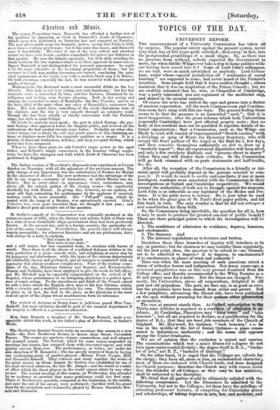Oratrts nut( 31154.
"Phe young Neapolitan tenor, Baucardi, has afforded a further test of his qualities by appearing as Carlo in Donizetti's Linda di Cliamouni ; 'Which opera was performed on Saturday last and repeated on Tuesday. The part gives small scope for dramatic power, seeing that Carlo is little more than a walking gentleman ; but it has some fine music, and Baucardi sang it beautifully. His voice is one of the very softest and sweetest tenors we have ever heard—neither remarkable for power nor deficient in that quality. He uses the falsetto sparingly, but with skill, avoiding the break between the two registers which is sa often apparent in tenor voices. Signor Baucardi is not distinguished for personal appearance : he ought to be the more attentive to the becoming proprieties of dress ; but his costume in Carlo was neither becoming nor correct, combining the prin- cipal equipments of the vieille cour with a modern black crop a la Brutus. On both evenings, especially the last, he was received with the strongest marks of favour.
Mademoiselle Ida Bertrand made a most successful debut as the boy Pierotto. This lady is not very young, nor very handsome ; but her fine contralto voice is untouched by time, and her features, illumined by in- telligence and feeling, soon become pleasing. Both in her acting and singing she reminded us more of Brambilla—the first Pierotto, and to us the beau idOal of the part—than any other of Brambilla's successors has done. Her low notes have someth.i.ng of the reedy chalumean tone of the clarinet, and the rise is very smooth through an extensive scale. Though she has been wholly or chiefly conversant with the Parisian stage, her style is quite Italian. Of Linda we scarcely need speak; the part in which Sontag—the pre- sent Sontag—first appeared before the English public, and revived all the enthusiasm she had excited twenty years before. Probably no other cha- racter brings out so finely the soft and gentle graces of this charming ac- tress, or displays more fully her exquisite qualities as a singer. It is a picture of innocent tenderness, delicacy, and deep yet quiet feeling, which fever has been surpassed.
When to these three parts we add Coletti's tragic power in the aged father, and Belletti's simple earnestness in the humane village magis- trate, we have the strongest east with which Linda di Chamouni has been performed in England.
























 Previous page
Previous page